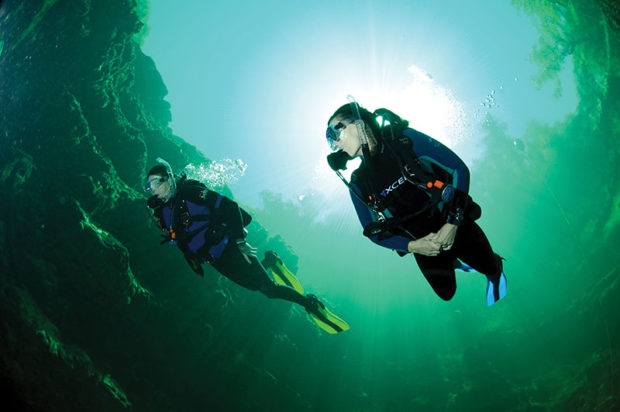Deep In the Pursuit of Learning

Text and Photo by Jill Heinerth
I’ve been told that I have a problem intellect, meaning that I am always in pursuit of learning. I think that is quite true. If I am not challenged with novelty and discovery, then I feel a sense of unrest. Change and challenge help me grow. For me, diving has provided a continual learning process. When people ask me how long it took me to prepare for a particular expedition, I tell them, “A lifetime.” I seek out continuous training and improvement and am always ready for change. As divers, it behooves us to closely examine how we learn. Understanding the process of learning and development can help us prepare for the pitfalls associated with each stage of the learning process.
Gordon Training International is popularly considered to be the originator of a model that describes the learning process — the conscious competence model. This model describes the steps of learning any new skill, and in my opinion, is particularly applicable to diving.
Gordon describes the first step of learning any new skill as “unconscious/incompetent” or “unconscious-unskilled.” This stage is a great description of how a diver feels on the first day of scuba class. He arrives at the dive shop with no skills at all, unaware of the proper functioning of his equipment and incapable of determining risk. He doesn’t know how to operate scuba equipment and doesn’t yet know what can kill him.
Stage two, and each stage thereafter, is often associated with a breakthrough. These steps offer the learner a sensation of awakening, when they feel like a light bulb went off. As the learner makes this step forward, she enters the realm of “conscious-incompetence.” At this point, a diver is beginning to understand the proper assembly, function, and procedures associated with diving and is able to assess risks, but still needs close supervision from a qualified instructor. Each class is a revelation as the diver develops skills and slowly achieves mastery in addition to a more rounded view of risk.
Next, the learner reaches the point of “conscious/competence.” This is the point when the diver completes initial training and receives a scuba qualification. At this level, the diver has mastered basic skills, has a good assessment of risk, and is able to succeed at self-rescue or buddy-rescue. This may be the point where he is the safest diver he can be. He still has a healthy fear that the equipment may fail and is consciously paying attention. Any nerves the diver feels are associated with a new understanding of risk. If you think back to each scuba rating you have ever achieved, you will recall these formative steps and the trepidation that is associated with learning.
The final stage of the learning process is the one that is most often ignored. But it is extremely important, since this step is where divers run into trouble. The final step occurs when the diver reaches a stage known as “unconscious/competent.” This is akin to someone who has been driving a car for a long time. She makes a daily commute and barely recalls the route she took or the things she saw along the way. She is a good driver, but has essentially fallen asleep at the wheel. The driving activity has become automatic. When this occurs in diving, it is the point when complacency kicks in.
With this in mind, rebreather divers with roughly 50-100 hours after their initial training may be at the greatest risk of having an accident, especially if nothing has scared them along the way. The same is true for open circuit divers. On a dive that you have repeated numerous times, you can become complacent about checking your SPG or dive computer. A serious gear malfunction in that timeframe can frighten a diver back to the previous level of learning, where he becomes the conscious driver of his rebreather unit or scuba gear again. A long absence from diving will also result in stepping backward in the learning model. If you are rusty you might be aware of risk but incompetent with your skills. You need to step backwards in your goals until you catch up with skills and practice. If I have been away from my rebreather for a period of time, I choose to jump into the shallow water of a spring or swimming pool until I have reviewed my skills and sharpened my awareness. The beginning of a dive season is not the time for an aggressive dive. If you have taken a winter break from diving, take it slow.
To avoid the pitfalls of complacency, good procedures and a commitment to pre-dive checklists are critical. A diver who carefully reviews her personal preparedness as well as her equipment readiness each time she goes diving will be better prepared to deal with the issues on the road ahead. For me it comes down to a simple set of questions. Are you prepared for self-rescue on the planned dive and are you willing and able to rescue your buddy? If the answer is yes, let’s go diving!
Leave a Comment







